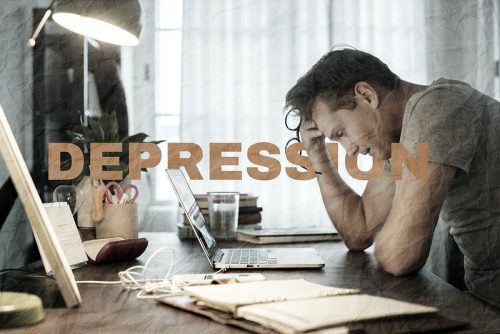Let me start my story of why I needed to fix my mental health. I used to be in love with Tyler. There was a considerable age gap between us (ten years), but it did not stop me from wanting to be with him.

In the first couple of years that we were together, he was full of charisma and elegance. He seemed so different from the boys that I liked in the past. Unfortunately, before our third anniversary, Tyler’s life hit a rough patch. The fall of his stocks in the market forced him to sell half of the company to anyone willing to buy it. He also had to let go of some employees and work double-time to accomplish his customer’s orders. Although those workers were willing to stay without getting paid much due to Tyler’s kindness to them over the years, he encouraged them to find new jobs.
During all this dilemma, I rarely saw Tyler. He was either cooped up in his office, bent over the accounting books, or driving a massive truck to deliver fresh meat to various restaurants. Even at night, whenever I asked if we could meet, he was always too busy thinking of ways to take his company off the ground again.
I missed Tyler during the three whole months that I only heard his voice. However, I understood why he wanted to focus on the company. He was a self-made man, you see. That was his bread and butter, and seeing it take a dip might have been too scary for him.

Noticeable Changes
In truth, Tyler’s busy schedule did not become the reason for our breakup. I never got jealous of it or acted like a bratty girlfriend who needed his undivided attention. No, the reason was that his outlook in life started to change in those three months that we didn’t see much of each other.
I should have known that something was up with our in-depth relationship inventory based on the increasing shortness of his replies to me. Before the business problem came, whenever I asked, “How are you?” his response was always an entire paragraph. He was still like, “You wouldn’t believe what happened today, babe. I closed this deal that I had been trying to get for weeks. Then, after that, I…”
Somewhere along the way, though, when I asked the same thing, he would merely say, “Good” or “I’m okay.” I chalked it to exhaustion every time because he was indeed working from 7 A.M. until God knows what time. So, imagine how surprised and hurt I was when I received a text from Tyler one morning telling me that he wanted to break up and needed a mental health reset. I was at home that time resting from overwork and only had a couple of hours of sleep.

The Painful Heartbreak
The bitterness that I felt that day remained unmatched up to this day. After all the patience and understanding that I showered Tyler, he wanted to crush my heart – through a text, the biggest jerk move that a person could ever do.
I was livid, of course. I wanted to curse Tyler repeatedly and tell him how awful he was. However, my anger slightly melted when I called him and heard him say, “You deserve to be with a better man. I am a loser now.”
Man. How could you beat up a guy with words when he was already beating himself up too much? Even if I still had many things to tell Tyler, I kept my mouth shut and accepted the freedom he gave me.

But before he turned his back to me, I said, “We may no longer be together as we speak, but you should let me help you recalibrate your mental health so that your views about the future could change.”
How To Be More Hopeful For The Future?
Tyler didn’t want my immediate help at that time and only relied on mental health app programs. It was expected because he just ended our relationship. But I told him to try the following to be more hopeful for the future:
Always Lower The Expectations
Stop thinking that everything will go as well as it has been in the past. Things change, and there’s nothing else you can do but accept it. If you don’t, you’re only making your life difficult and even damaging your health. You’ll feel exhausted and your mental health may experience issues.

Find Out Why Awful Things Happened
There will always be a reason why you experience increased mental health stress from awful things. However, it is often because you need to learn a lesson. Figure out what lesson you have possibly missed and understand how to fix your problems. When you’re feeling down or you think you need a mental health reset, start with focusing on your personal growth with the help of guided meditations.
Best Look For A Hobby
It would help if you also did something else or worked with creative activities in your present moment. Working on the same things and incorporating them as a daily routine without rest will make you lose sight of your goals. Try changing your daily routine, find fun, eat healthfully, and stick with healthy ways. You can try reading, knitting, skydiving, or whatever fancies your interest. Or you can exercise regularly so you can focus on restoring good sleep and get rid of your mental health issues such as anxiety. You can also try and move your body to secure your mental and physical aspects and use it as your way for the overall health reset.
Bottom Line
After a few months, Tyler came back to me to tell me that he followed my tips and that his physical health and mental health were more stable than ever. I couldn’t be happier for this man, and we became close again. Maybe – just maybe – we can be together once more in the future. One can stay present and hope, right?
Frequently Asked Questions
How Can I Reset My Mental Wellness?
How do you rebalance mental health and well-being?
How do you reboot mentally?
How long does a mental reset take?
Can you reverse mental health issues?
Can you fix bad mental health?
What is the 30-day mental reset?
Why do I feel imbalanced mentally?
How do I rebalance myself?
How do you stop mental instability?
Do I have a mental illness, or am I overreacting?
What happens if you ruin your mental health?
Which food is good for mental health?
Can you handle mental illness on your own?
What are three ways to rebalance?


